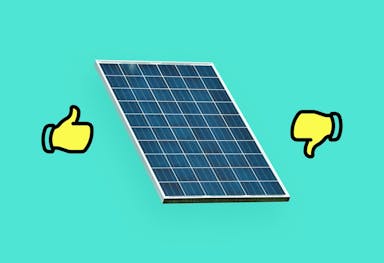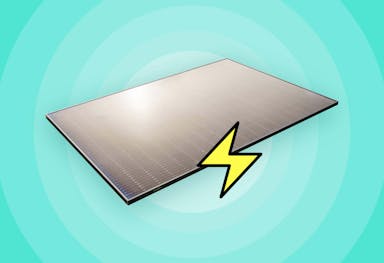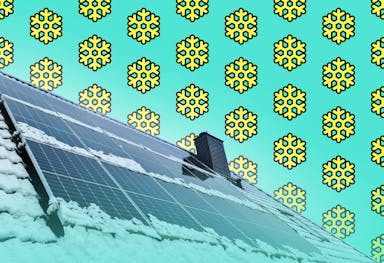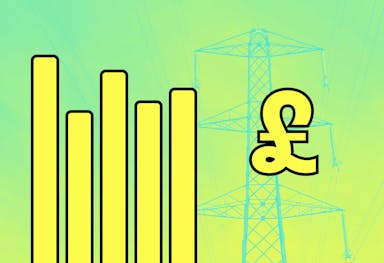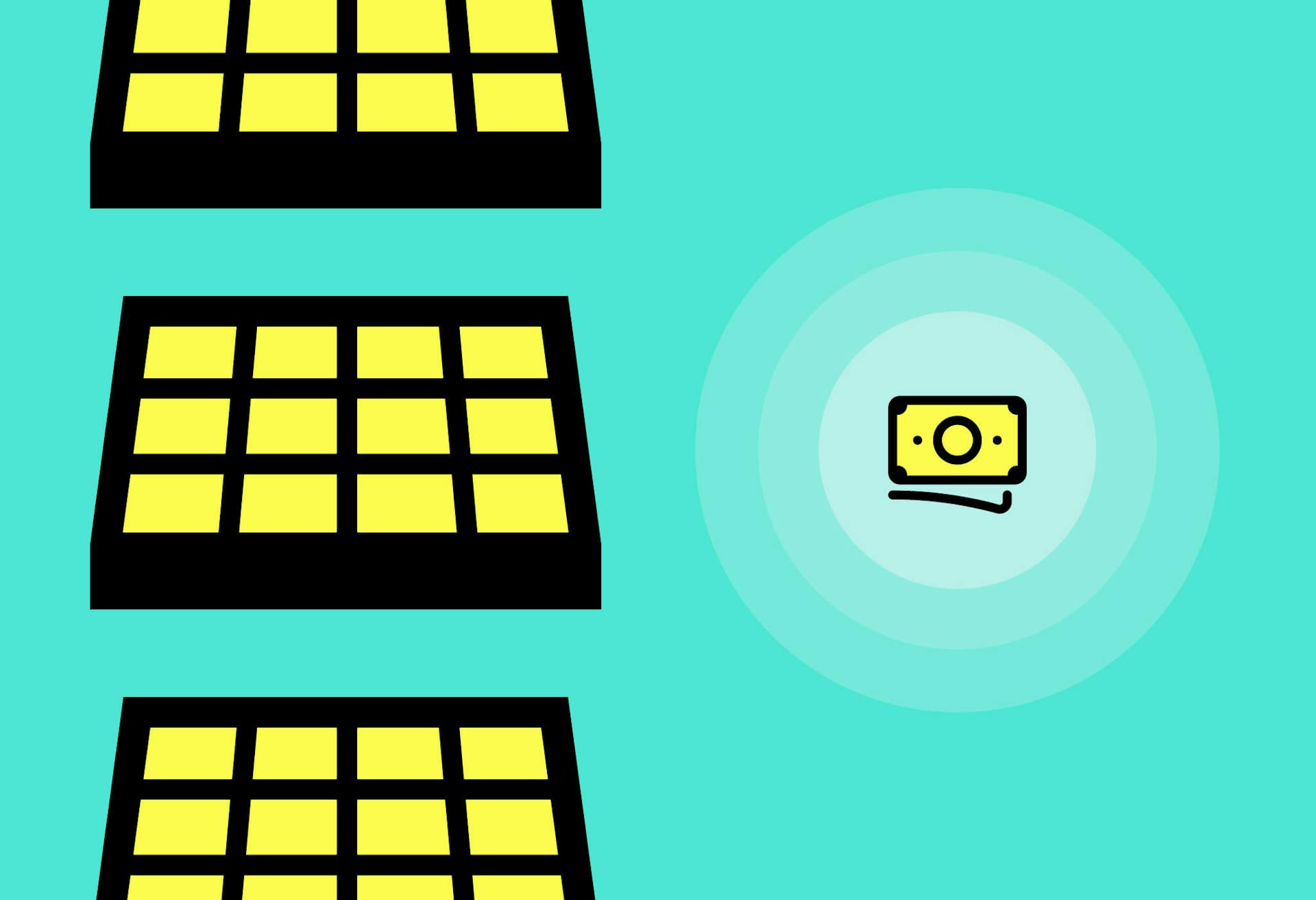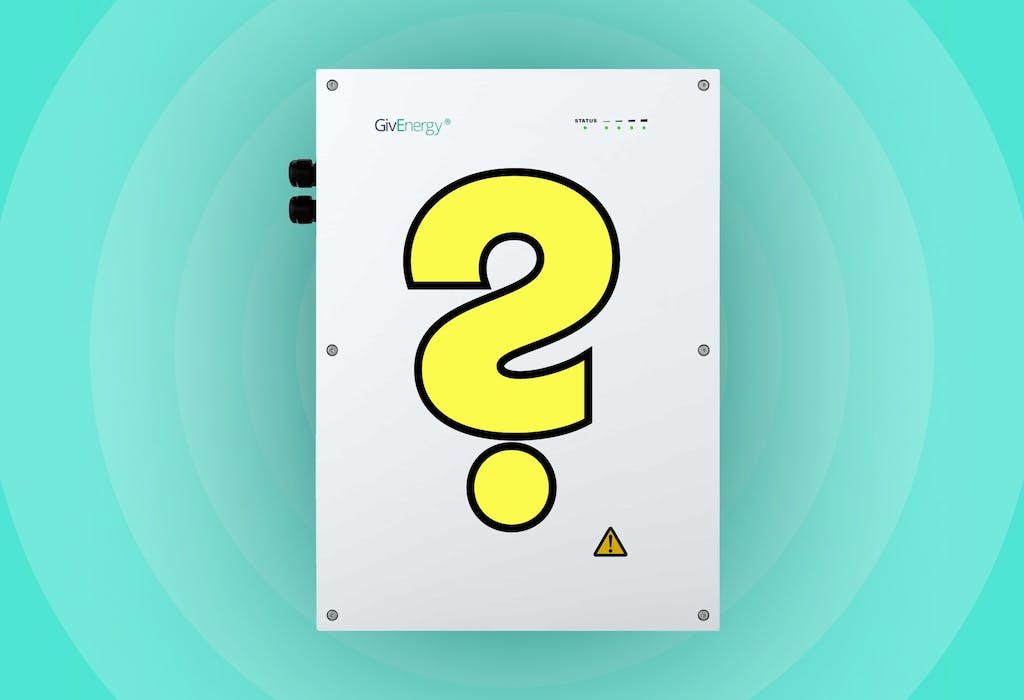- Solar advice hub
- Costs
- Are solar panels worth it in the UK?
Are solar panels worth it in the UK?
Here's how much you can save with solar panels, their average break-even point, and all the factors that affect these numbers.


Why you can trust our content
We know that the solar industry is full of misinformation, but we only use reliable sources, including:
- Our experienced solar experts, installers and system designers
- Our own database of solar & battery system designs
- Authoritative bodies like MCS and the UK government



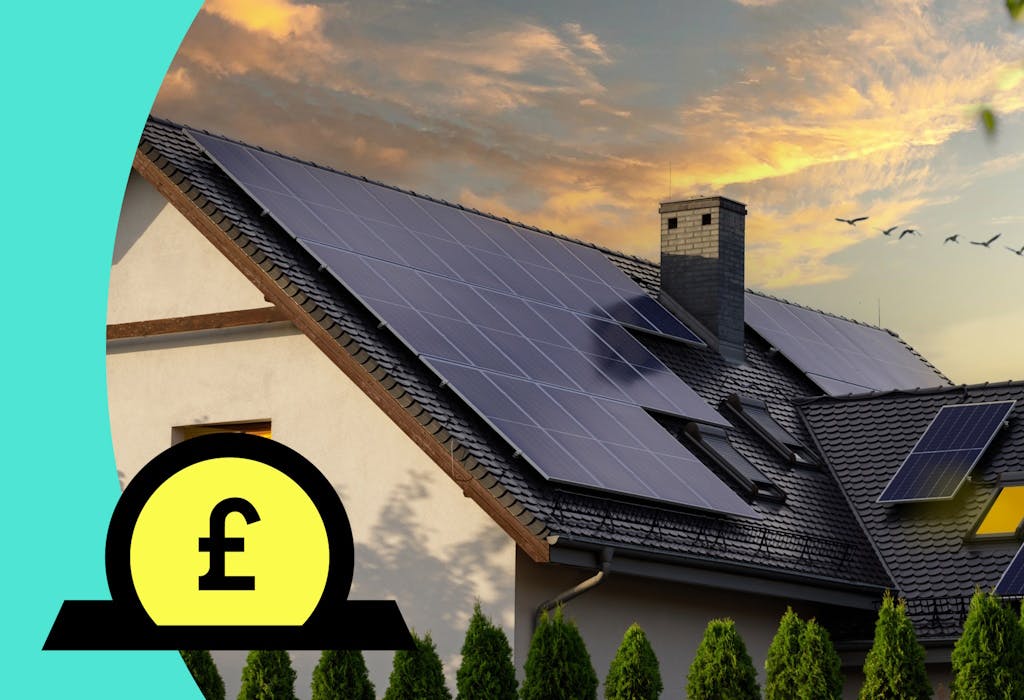
Calculate savings
What kind of home do you live in?
Calculate savings
What kind of home do you live in?
At a glance
Before you buy solar panels for your home, you’ll want to find out whether they’re worth the investment.
Using the sun to generate free, green energy can benefit you financially and environmentally – but it usually comes with a high upfront cost.
In this guide, we’ll address whether solar panels are worth it in a broad sense, by explaining everything from how much you'll save on your electricity bills and add to your home's value to how going solar will reduce your carbon footprint and protect you against energy price rises.
If you’re wondering how much a solar & battery system could save you, just answer a few quick questions below and we'll generate an estimate for you.
Find out how much you can save
What kind of home do you live in?
Is it worth getting solar panels in the UK?
It’s absolutely worth getting solar panels in the UK, which is why more than 1.5 million homes have had them installed (more on that further down).
For the majority of households, solar panels provide some excellent benefits and gradually pay off their upfront cost.
They can save you hundreds of pounds per year on your electricity bills, and tens of thousands of pounds over their lifespan.
This high level of savings means a solar & battery system will break even in just over eight years on average, and protect you against energy prices rising in the future – more on that in the next section.
Solar panels can also raise your home’s value, and they do all of this while also shrinking your carbon footprint by around a tonne of CO2 per year.
We'll go into more detail about each of these benefits later on in this article.
Verified expertWe’re saving about £400 each year, which is great. My main goal through Sunsave Plus was to cancel out my current energy bill, but now the system is actually paying for itself.
Tim
Sunsave customer
Got Sunsave Plus in June 2024
When do you break even on solar panels?
It takes just over eight years for a solar & battery system to pay for itself, on average.
This is based on a sample of over 150 solar & battery systems installed by Sunsave across England and Wales in 2024. The average system size is 6.1kWp, with 51% of solar electricity used at home and the other 49% exported to the grid, on average.
Payback periods vary substantially across different installations, though.
Solar panel payback period: examples around the UK
| County | System size (kWp) | Battery size (kWh) | Annual consumption (kWh) | Electricity generated (kWh) | Payback period |
|---|---|---|---|---|---|
| Northamptonshire | 5.16 | 8.7 | 6,618 | 5,131 | 7.1 years |
| County Durham | 12.47 | 14.5 | 9,173 | 10,479 | 6 years |
| Shropshire | 10.3 | 6 | 15,737 | 9,311 | 6.7 years |
| East Riding of Yorkshire | 10.75 | 8.7 | 10,231 | 8,226 | 5.1 years |
| Gloucestershire | 4.73 | 5.2 | 2,776 | 4,133 | 7.5 years |
| Buckinghamshire | 11.18 | 11.6 | 9,134 | 9,091 | 5.6 years |
| Cornwall | 4.3 | 5.8 | 2,375 | 4,308 | 7.2 years |
How long do solar panels last?
Monocrystalline solar panels usually last between 30 and 40 years, giving the average household 22-32 years of pure profit after breaking even.
These black panels are used in the majority of installations these days, which is great news for those homes’ payback periods.
Polycrystalline solar panels, which are blue, generally last 25-30 years – though they're now a thing of the past. They make up 0% of all solar panel production, according to the National Renewable Energy Laboratory.
Your battery’s lifespan will be shorter, as they tend to seriously decline after 10-12 years, so you’ll need to replace it before your panels. With Sunsave Plus, you can get a free replacement battery, as you’ll be covered by the Sunsave Guarantee.
For more information on solar panels’ lifespans, check out our full guide to how long solar panels last.
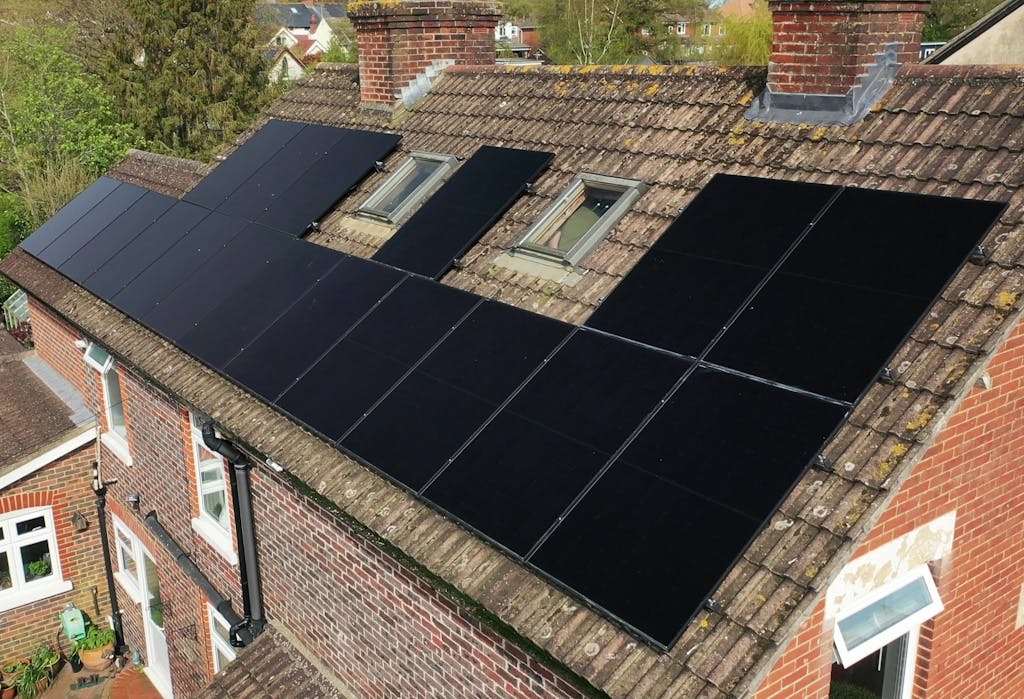
How do solar panels pay back your investment?
Solar panels pay back your investment in two key ways. Firstly, by producing electricity, they reduce the amount you need to import from the grid.
And secondly, you can sell the excess electricity they generate to the grid with an export tariff.
Here’s how these factors save and earn you money, in more detail.
1. Reduced electricity imports
You can significantly decrease the amount of electricity you buy from the grid, since you’ll be able to replace much of it with solar-generated electricity.
And every time you use the electricity produced by your own panels instead of importing grid electricity, you’ll save money.
The chart below shows roughly how this could work for a UK household across the year.
In winter, your panels will reduce your grid imports by around 25%, and you’ll produce more solar-generated electricity in the summer months, allowing you to cut your grid electricity needs in half.
Electricity imported before and after solar
2. Export income
In the summer months, your solar panel system will likely generate more electricity than your household can use, even with a battery.
If you sign up to an export tariff, you can easily sell this excess electricity to the grid, potentially earning you hundreds of pounds per year.
This allows you to make money from electricity you would have funnelled into the grid anyway, shrinking your payback period even further.
If you're comfortable with switching energy suppliers, you can make £343 per year by signing up to Good Energy's Solar Savings tariff, which pays 15p per kWh.
This figure is based on a home that uses 3,400kWh of electricity per year (which is the UK average) with solar irradiance of 850kWh per kWp, a 4.6kWp solar panel system, a 5.2kWh battery, and which exports 65% of its solar electricity.
It’s not just about your export income, though – it’s also about the import tariff you combine it with.
We'd currently recommend Good Energy EV Charge, which offers a 6.6p per kWh off-peak rate between 12am and 5am, and can save you another £739 compared to a household without solar that's on the July 2025 price cap.
To see the latest top tariffs, check out our full guide to the best SEG rates.
If you would like to see the savings you could get from a solar & battery system, answer a few quick questions below and we’ll provide an estimate.
Find out how much you can save
What kind of home do you live in?
Are the economics of solar panels improving?
The economics of solar panels have gotten a lot better in recent times, and that’s down to two crucial factors.
The cost of solar panels fell dramatically in the past two decades. Between 2008 and 2021, the global price plummeted by 93%, according to Our World in Data.
And though it’s stabilised since then, going solar is still much more affordable globally than it’s been at any other time in history.
The falling cost of solar panels
The other major factor in the economics of solar panels getting better is the gradual increase in export tariff rates.
The main driver behind this trend has been the Smart Export Guarantee (SEG). This government initiative, which launched in 2020, compels energy suppliers with at least 150,000 domestic electricity customers to provide an export tariff.
Households are free to choose any export rate they qualify for, regardless of who they get their electricity from – and after a slow start, prices have risen to extremely profitable levels.
In the space of just a few years, the average rate has increased from 4.3p per kWh to 8.9p per kWh, and by switching their electricity supplier, customers are able to access rates that pay 20p per kWh or higher.
The growth of solar export tariff rates, 2020-24
Verified expertIt’s been really fascinating to monitor the performance of our system and see how much energy we’re generating. So far, it’s safe to say it’s been overperforming against our expectations.
Themis and Freya
Sunsave customers
Got Sunsave Plus in January 2024
What factors affect the payback period of solar panels?
Multiple factors affect the payback period of solar panels.
You can often control a large number of these considerations – and you should take every reasonable step you can to do so.
For instance, you might not be able to affect how much daylight hits your roof, but you can choose one of the best solar panel installers around.
Here are the five main factors that can affect your payback period:
- Your solar panels’ attributes
- Whether you have a battery
- Your system’s location
- Your financial choices
- Your electricity usage
1. Your solar panels’ attributes
The size and efficiency of your solar panels will have a huge impact on how much electricity they produce, which will directly affect your energy bill savings and the length of your payback period.
The higher your system's peak power rating, the shorter your payback period, and if your panels are particularly efficient, they'll be able to generate more electricity while taking up less space – which may mean you can fit more panels on your roof.
You should also watch out for your panels' degradation rate, as this will affect how much electricity they produce as the years go by. Check a panel's performance warranty to see the minimum output that the manufacturer guarantees at different points in its lifespan.
The kind of inverter your system uses will have an effect too. Depending on your setup, using string inverters or microinverters may result in higher overall generation.
And of course, any downtime your system suffers will extend your payback period – which is one of the best reasons to get a high-quality set of solar panels.
2. Whether you have a battery
Your payback period will be heavily impacted by whether you have a solar battery or not.
If you do get a battery installed, its capacity and discharge rate will affect your savings. They'll determine how much of your solar electricity you can use, and how much you'll have to export to the grid.
On the flip side, your battery will have a shorter lifespan if you charge and discharge it too often – and the sooner you have to replace your battery, the longer your payback period.
3. Your system’s location
How much electricity your panels produce is one of the biggest influences on your payback period – and your property's location has a large impact on your system's generation.
Whether you live in one the sunniest places in the UK or not, the amount of daylight that hits your panels will directly impact how long your payback period is.
It's not just geographical location that matters, though. Your system's angle and direction will also affect how much electricity it will generate, along with how much shading it endures.
The location of your property will also determine how much dust and debris lands on your panels, which can slightly reduce the amount of electricity they produce, especially if you live on the coast.
4. Your financial choices
Your payback period will be largely shaped by the amount you pay for your system. The less you pay, the sooner you'll reach your break-even point, all else being equal.
The price you pay for grid electricity will also affect the length of your payback period, so make sure you choose a supplier and tariff that work for your household.
And the amount you receive for the electricity your system exports to the grid will also impact your timeline, which is a great reason to pick one of the best export tariffs.
5. Your electricity usage
The more electricity you currently use, the more you can save by getting solar panels – and the shorter your payback period should be.
Since solar panels can last up to 40 years, make sure you take your future electricity consumption into account too.
For instance, if you're planning on getting a heat pump or electric vehicle charger at some point, a bigger system may be more profitable – though it could change your payback period.
Your daily and annual usage patterns will also have an impact, as they'll dictate how much of your solar electricity you use, and how much you send to the grid.
For example, if you consume more electricity in the summer, this should benefit you, as your panels will generate more electricity during this period.
How many UK homes have solar?
More than 1.5 million (1,588,496) homes now have solar panels in the UK, as of November 2025, according to government data.
That means 5.5% of households have made the switch.
The adoption rate is increasing, too – more systems were installed across 2023 and 2024 than in the previous six years combined.
This all shows that there is an exciting, growing trend of people deciding to cut their bills with solar-generated electricity.
And with every additional household that saves money by harnessing this popular technology on its rooftop, the clearer it is that solar works well in the UK.
Regional distribution of solar homes in the UK
Sunsave researchers have used the latest constituency-level government data to calculate the percentage of homes with solar in each UK region.
The South East has the most solar homes of any region in the UK, with more than 215,000.
However, the South West has the highest penetration rate, with 8.5% of households in the region having switched to solar.
The fact that these two neighbouring regions top the charts makes sense, since they're home to some of the sunniest places in the UK.
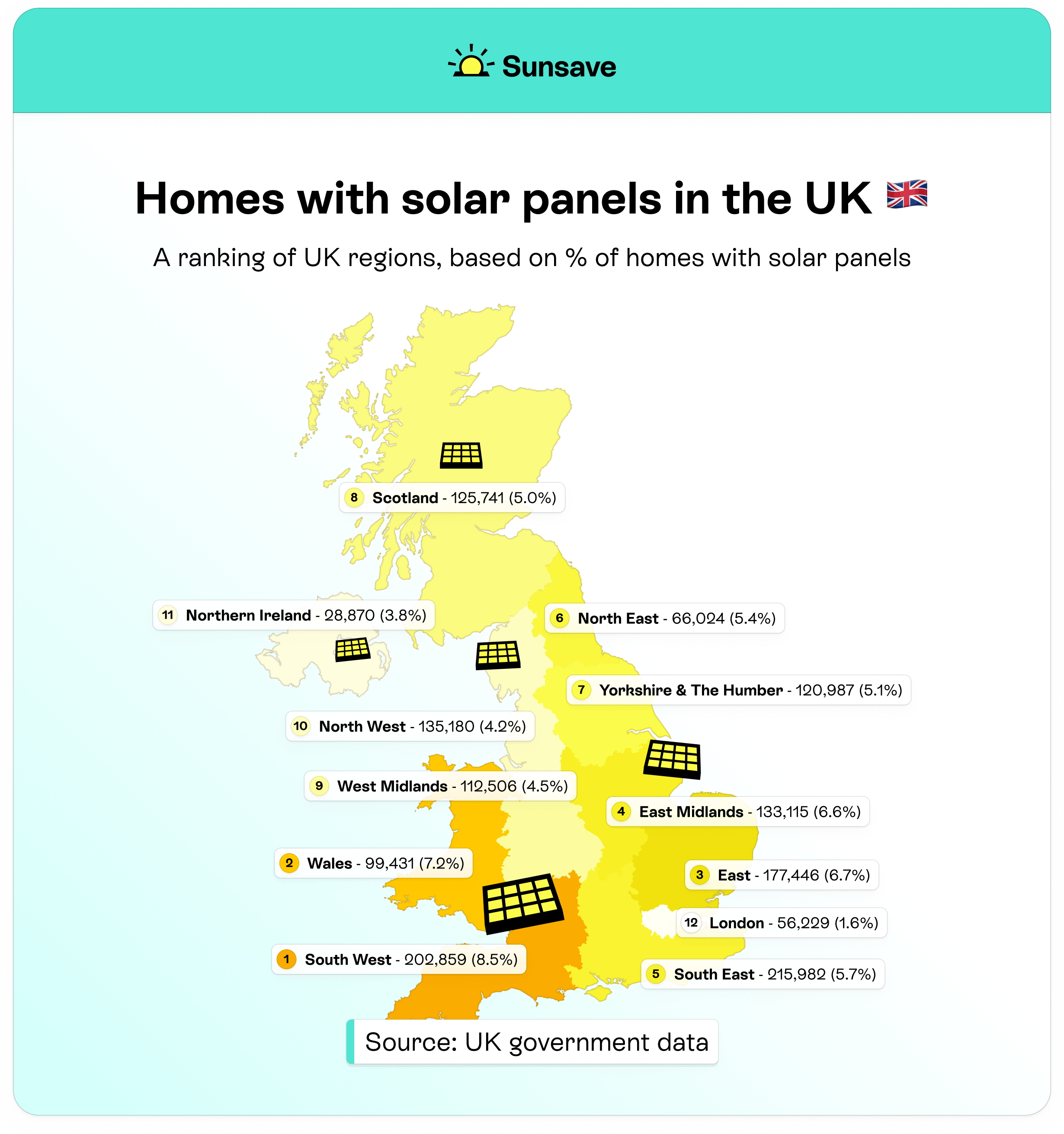
However, some other regions are showing you don't need the most direct sunlight to save on your energy bills. The North East stands out in this regard, with 5.4% of its homes having gone solar.
Uptake in Northern Ireland is relatively low, though it's not far behind the North West, and the number of installations has increased significantly in the past two years.
London's penetration rate is a total outlier, especially considering its location in the south-east of England, which allows it to receive more sunshine than most areas.
Unfortunately, the capital also has a higher proportion of rental properties and flats, both of which aren't particularly conducive to going solar.
Houses are often tall, narrow, and situated in cramped terraces, all of which limits roof space and makes putting up scaffolding difficult and expensive.
Plus, with space at a premium in London, people often choose to get a dormer instead of solar panels.
Check out the chart below to see how residential solar adoption has developed in the UK since 2010.
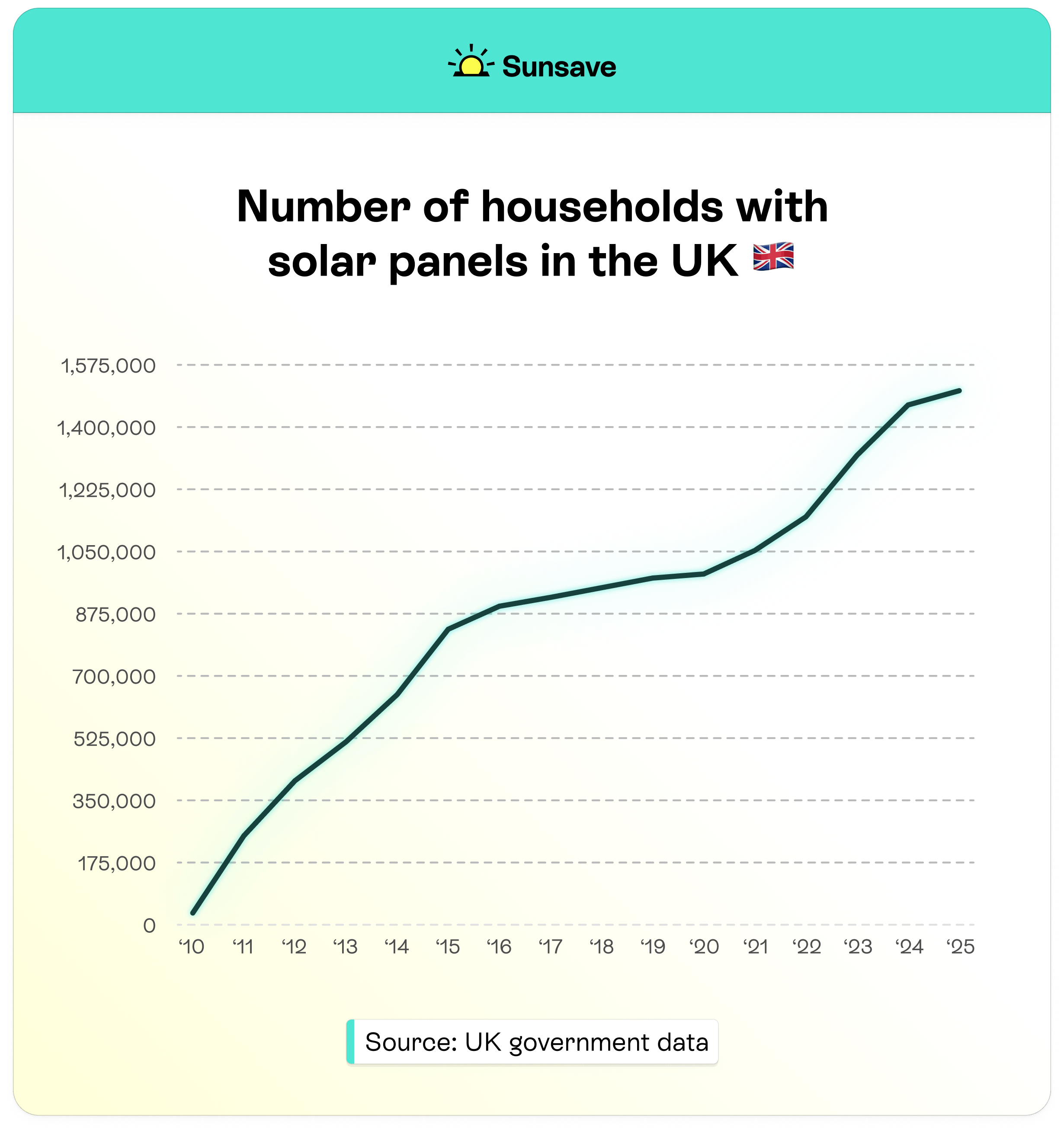
UK solar adoption compared to Europe
Sunsave researchers have compiled the figures from various reports from governments and industry publications, and compared them with official household numbers to find the solar penetration rates for each country.
The UK ranks an impressive fourth in western Europe, behind the Netherlands, Germany, and Italy.
The Netherlands is miles ahead of any other nation in our ranking, with a massive 34.2% of Dutch homes having gone solar as of mid-2023, according to Reuters.
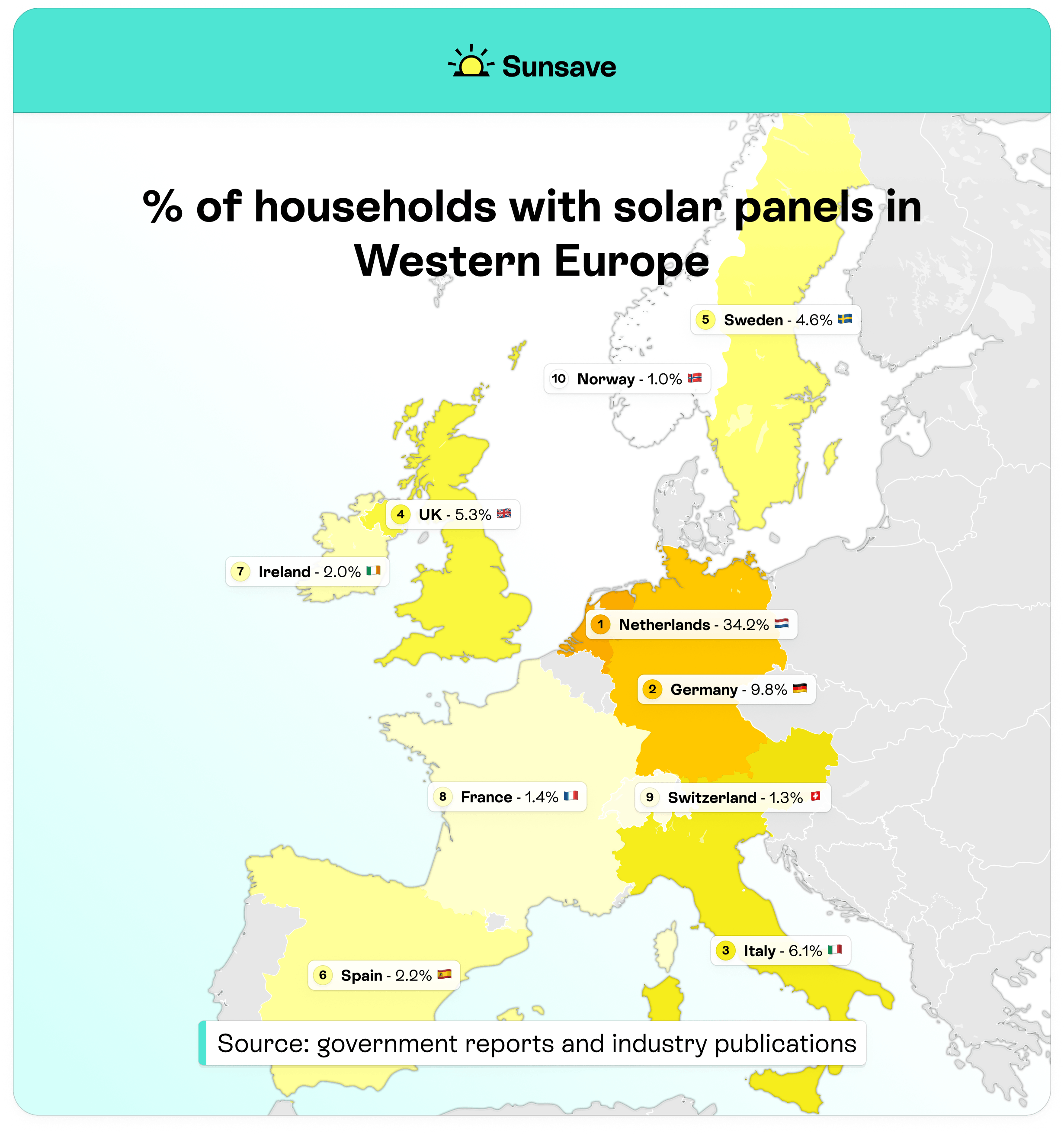
The percentage of UK homes that have gone solar is twice as high as it is in Spain, three times higher than in France, and four times higher than in Switzerland – all of which are significantly sunnier nations than the UK.
We're also doing five times better than clean energy giant Norway, which is no mean feat.
With well over 100,000 homes going solar in each of the past three years, things are moving in the right direction.
Ultimately, the goal should be to at least match Germany, which has a similarly sized population and economy, but nearly twice as many solar homes as the UK in percentage terms.
What’s the average cost of solar panels?
The average cost of a 4.5kWp solar & battery system for a property with two or three bedrooms is about £11,307, including installation.
This is a great time to get a solar & battery system, as there’s currently 0% VAT on both panels and batteries.
These costs are of course just estimates, and can vary widely on a whole range of factors, including the size of your system and the complexity of the installation.
For more information, read our guide to solar panel costs.
Are there any grants available?
There are some solar panel grants available from the government, including the ECO4 scheme, Home Upgrade Grant, Warm Homes: Social Housing Fund, and – if you live in Wales – the Warm Homes Programme.
However, all these initiatives come with stringent requirements meant to ensure that only low-income or otherwise deprived households get free or largely subsidised solar panels.
If you're eligible, solar panels make up 18% of the measures handed out by these four schemes, overall.
The government isn't currently offering any solar grants that are open to all homes.
Find out how much you can save
What kind of home do you live in?
Do solar panels work in the UK?
Solar panels work well in the UK, despite the less than ideal weather.
The technology has come on leaps and bounds in the past decade or so, especially in terms of efficiency and peak power ratings.
With a standard 4.3kWp system, a UK household with typical irradiance (850kWh per kWp) will produce 3,655kWh of electricity per year – more than the 3,400kWh that the average home uses annually.
This output isn't evenly distributed across the year, with solar panels generating considerably more energy in summer, but even in winter and on cloudy days, your system will still keep producing plenty of electricity.
You can see as much in the chart below, which shows that nearly 40% of your system’s generation will happen in summer, compared to 11% in winter.
Solar panel output by season
Verified expertI had waited for eight or nine years before deciding to go ahead with Sunsave, primarily because, number one, it's a huge upfront cost. And number two, one of the biggest problems is that after you pay this huge upfront cost, there's no-one responsible for maintaining the unit for the rest of its life. That was the good thing with Sunsave.
Samir
Sunsave customer
Got Sunsave Plus in October 2024
Four other reasons to get solar panels
Solar panels aren't the right choice for everyone – but they come with a lot of benefits that are worth investigating.
Here are the best additional reasons why you should consider getting a solar panel system for your household, which we'll expand on below:
- They can shrink your carbon footprint
- They can protect you from rising energy costs
- Your home’s value could increase
- They work with heat pumps and EVs
1. They can shrink your carbon footprint
A solar panel system cuts your household's carbon footprint by 1.1 tonnes of CO2 per year, on average - or 31%.
This estimate is based on the average CO2 saving made by 32 different solar & battery system designs from Sunsave’s database, comprising properties from all over England and Wales. Each system in this sample uses 430W solar panels and a 5.8kWh battery.
The average UK home is responsible for 3.5 tonnes of greenhouse gas emissions per year, according to government data that shows the country's 28.6 million households emit 26% of all emissions.
So the 1.1 tonnes of CO2 the average solar home saves every year shrinks its carbon footprint by 31%.
And the larger your system, the more CO2 you can save.
2. They can protect you from rising energy costs
The price of household energy is set to stay high for years to come – but thankfully, solar panels can lessen the impact by providing you with a free source of electricity.
Past data from the Office for National Statistics (ONS) shows that between 2000 and 2020, electricity prices rose by 5.5% per year, on average.
Predicting the future is always difficult, but electricity price rises before 2022 were largely driven by inflation and grid upgrades, which are likely to continue being massive influences on your energy bills.
The UK is legally obliged to reach net zero emissions by 2050, which will require us to power energy-intensive processes like heating, lighting, and transport with green electricity – but that means we’ll need more than twice as much electricity as we use now.
That's why industry experts generally expect energy bills to stay high until the late 2030s, at least.
The cost of developing the UK’s grid infrastructure will be passed onto consumers, meaning your energy bills may keep rising well into the foreseeable future.
Thankfully, solar panels can instantly cut your bills by making you less dependent on expensive grid electricity, and your savings are likely to grow over their decades-long lifespan.
Verified expertSolar panels produce less electricity in the winter than they do in the summer, but across a 12-month period it balances out and leads to significant energy bill savings. You’ll need to rely on the grid a fair amount in the winter months, but in the summer months you’ll tend to produce more electricity than you need and sell the excess to the grid.
Alfie Ireland
Head of Operations & Technical at Sunsave
Alfie has worked in green tech for over a decade. During his four years at OVO, he helped develop the world’s largest domestic vehicle-to-grid trial.
3. Your home’s value could increase
Solar panels can raise your home's value by 3%, adding thousands of pounds to its price tag.
This is due to their impact on your property’s Energy Performance Certificate (EPC) rating – an energy efficiency grade between A and G that's visible to everyone, including any potential buyers.
If you increase your EPC grade from a D to a C, your home’s value will go up by 3% on average, according to a 2023 study of 300,000 properties by Rightmove.
A solar panel system typically boosts a home’s EPC rating by 18 points – a whole grade – according to our calculations, which are based on the government’s Standard Assessment Procedure (SAP) guidance.
This will enable you to make as much as £10,000 more from selling your property, according to the Sustainable Homes and Buildings Coalition.
Verified expertThe relationship between solar panels and property value is already very good, and it’s going to keep on improving. As more people switch to heat pumps and electric cars and the demand for electricity rises, the value of solar panels will go up too. In fact, McKinsey estimates that electricity demand in the UK will rise by 50% between 2022 and 2035.
Alfie Ireland
Head of Operations & Technical at Sunsave
Alfie has worked in green tech for over a decade. During his four years at OVO, he helped develop the world’s largest domestic vehicle-to-grid trial.
4. They work with heat pumps and EVs
UK households are increasingly exchanging their fossil fuel-powered heating systems and cars for heat pumps and EVs.
More than 250,000 heat pumps are now installed in the UK, with over half of these having been fitted since the start of 2021.
Electric vehicles have also become much more popular in recent years. There are now five times more EVs on the road than there were in 2020, according to ZapMap.
This all means households will spend more on electricity – unless they go solar, and run these products on their own supply of renewable electricity.
And this is one of the key downsides of solar thermal panels, which some eco-conscious households in the UK consider, but are not compatible with any other modern green tech.
Verified expertWhen you get solar panels installed, it’s important to remember that they’ll be generating the most energy during the middle of the day, so that’s the best time to do high-energy tasks. Put simply, if you don't have a home battery, the more of your solar power you use, the less you need to buy from the grid later.
Dr. Steve Buckley
Energy Doctor and Head of Data Science at Loop
With a background in statistics and data science, Steve is in charge of product direction at Loop and has worked at multiple successful startups.
Important things to consider before going solar
Like any other home improvement or piece of technology, there are a few issues you should take into account before you purchase a solar panel system.
Here are the most important factors to assess.
There are certain roof requirements
A minority of roofs aren't right for solar panels.
Some are too small to fit panels. A 3kWp system requires about 23m² of roof space, while a 5.2kWp array takes up around 38m².
Others are too shady. You can also get away with some shade on your panels, but excessive amounts will severely limit your system's output.
If you have any lower roofs, such as the ones on a conservatory or extension, your installer may also find it hard to construct the scaffolding they need to put panels on the roof.
It's often tricky to install solar panels on flat roofs too, as they require ballasts that make the system around five times heavier. The installer might also have to drill through the roof, which can cause leaks.
Fortunately, a south-facing roof is no longer an essential requirement, thanks to huge improvements in solar technology.
East-west arrays are extremely fruitful, and having part of a system facing north can be very productive. For more information, check out our guide to north-facing vs south-facing panels.
Nevertheless, it's worth making sure that your roof is suitable for solar panels, then getting a professional installer to do the same.
Thankfully, most domestic roofs in this country will have no trouble meeting these requirements. They're usually strong enough and pitched at a good enough angle, and most other issues are manageable.
There’s a high upfront cost
Solar panels usually cost thousands of pounds upfront – for instance, a 4.5kW system will typically set you back about £11,307.
About half of UK households have less than £5,000 in savings, according to the FCA, which puts solar panels out of reach for millions.
It can also be tempting to buy used solar panels, but there are a lot of risks associated with this.
Thankfully, you can use Sunsave Plus to completely remove the upfront cost.
Our solar subscription offers 24/7 monitoring and maintenance, free replacements for your battery and inverter, insurance against damage, fire, and theft, and downtime cover – all for a fixed monthly fee.
It also comes with the best-in-class kit that will work seamlessly, look excellent, and save you money from day one.
You might need permission
Most UK homeowners don't need planning permission to go solar, as their permitted development rights enable them to make medium-sized improvements without clearing it with anyone.
However, if your home is a listed building, a flat, or in a conservation area, you should contact your local authority to check whether you need permission.
You'll also need to apply for planning permission if you're intending to install ground-mounted solar panels.
You’ll still need to use the grid
Solar panels won't cover your entire electricity usage, unfortunately.
They don't generate electricity at night, and their output drops during colder months, when there are fewer daylight hours.
Roughly speaking, solar panels in the UK will generate about 70% of their annual output in spring and summer, and the other 30% in autumn and winter.
A solar battery can enable you to use more of the electricity that your panels do produce, but you won't be able to store enough energy for long enough to fulfil all your electrical needs.
You'll therefore have to rely on the grid at times – though you'll generally reduce your dependence by more than half, according to our calculations.
They require maintenance
Any piece of hardware will require maintenance at some point, and solar panels are no different.
Some technical experts in the industry estimate that a solar & battery system in the UK will need three maintenance call-outs across a 20-year period - one for the panels, one for the battery, and one for the inverter.
The battery and inverter will usually last 10-12 years before needing to be replaced, which means additional costs are inevitable – that is, unless you sign up for Sunsave Plus.
Our subscription service comes with the Sunsave Guarantee, which means that for a fixed monthly fee and no upfront cost, we'll ensure your solar & battery system remains in superb condition for 20 years.
Next steps
Solar panels are the best, most cost-effective way to generate green energy that you can use to cut your electricity bills.
On average, they come with a break-even point of just over eight years, hundreds of pounds in annual savings, and a potential boost to your home’s value.
And with energy prices staying high even as the UK moves towards a greener, more electricity-heavy future, they can soften the impact of any price rises.
FAQs
Related articles

Written byJosh Jackman
Josh has written about the rapid rise of home solar for the past six years. His data-driven work has been featured in United Nations and World Health Organisation documents, as well as publications including The Eco Experts, Financial Times, The Independent, The Telegraph, The Times, and The Sun. Josh has also been interviewed as a renewables expert on BBC One’s Rip-Off Britain, ITV1’s Tonight show, and BBC Radio 4 and 5.





